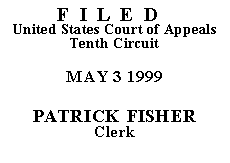

| UNITED STATES OF AMERICA,
vs.
LEVONE RAY MADEN |
|
In this appeal, Mr. Maden challenges the constitutionality of the disparity between penalties for crack cocaine and powder cocaine, as well as the sufficiency of the evidence for a finding that the substance he possessed was actually crack cocaine.(1) Our jurisdiction arises under 28 U.S.C. § 1291 and 18 U.S.C. § 3742(a), and we affirm.
As an initial matter, the mandate rule precluded the district court from hearing these issues because the panel in Mr. Maden's initial appeal specifically instructed the court to resentence Mr. Maden within the applicable guideline range. See United States v. Webb, 98 F.3d 585, 587-88 (10th Cir. 1996). None of the exceptional circumstances identified in Webb, which would have permitted the court to depart from our mandate, were present in this case. See id. at 587.
However, even apart from the mandate rule, both issues are without merit. We have ruled numerous times that the Constitution is not violated by the disparity in treatment between crack cocaine and powder cocaine. See United States v. Williamson, 53 F.3d 1500, 1530 (10th Cir. 1995) (citing cases).
Mr. Maden argues that the government failed to prove that the substance he
possessed was crack cocaine because it allegedly was not at least fifty percent pure. However, neither the Sentencing Guidelines nor the statute under which he was convicted establishes a purity level for crack cocaine. See USSG § 2D1.1(c) notes to drug quantity table (D) (compare notes (B) & (C) which establish purity levels for "PCP" and "Ice"); 21 U.S.C. § 841(b)(1)(A).
AFFIRMED.
Entered for the Court
Paul J. Kelly, Jr.
Circuit Judge
*. This order and judgment is not binding precedent, except under the doctrines of law of the case, res judicata, and collateral estoppel. This court generally disfavors the citation of orders and judgments; nevertheless, an order and judgment may be cited under the terms and conditions of 10th Cir. R. 36.3.
**. After examining the briefs and the appellate record, this three-judge panel has determined unanimously that oral argument would not be of material assistance in the determination of this appeal. See Fed. R. App. P. 34(a); 10th Cir. R. 34.1 (G). The cause is therefore ordered submitted without oral argument.
1. Although represented by counsel, Mr. Maden makes this second challenge in a pro se "Supplemental Petition for Appellant's Opening Brief." The government has responded to the argument; thus we consider it.